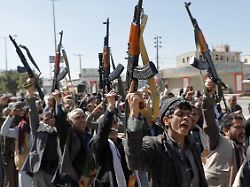Far-reaching sanctions possible
Washington puts Houthi on terror list
January 17, 2024, 5:41 p.m
Listen to article
This audio version was artificially generated. More info | Send feedback
The Houthis have been firing rockets at Israel and attacking ships in the Red Sea for weeks. Now the USA is putting the fighters back on its list of global terrorists. In contrast to the EU: However, it has already reacted differently.
The government of US President Joe Biden is putting the Houthi militia in Yemen back on the list of global terrorists. The reason was the ongoing attacks by the Iranian-backed group in the Red Sea and the Gulf of Aden, the White House announced. The classification means that more far-reaching sanctions will be imposed against the Shiite militia, which has recently repeatedly fired rockets into the south of Israel.
“These attacks are a clear example of terrorism, a violation of international law, a grave threat to human life and global trade – and they jeopardize the provision of humanitarian aid,” said a senior US government official in Washington. When classifying terrorism, the USA distinguishes between globally active terrorists (“Specially Designated Global Terrorists”, SDGT) and foreign terrorist organizations (“Foreign Terrorist Organizations”, FTO). The distinction plays a role in the sanctions associated with the classification.
Shortly before the end of former US President Donald Trump’s term in office in 2021, his Secretary of State Mike Pompeo ordered the Houthis to be classified in both categories. Pompeo’s successor, US Secretary of State Antony Blinken, reversed this shortly afterwards to make it easier to deliver humanitarian aid to Yemen. Civil war has been raging in the very impoverished country since 2014. A large part of the population lives in areas controlled by the Houthis. According to the UN, millions of people suffer from hunger.
According to information from Washington, the renewed terror classification of the Houthi militia will only come into force in 30 days. In the meantime, the US government wants to create special humanitarian regulations together with UN aid organizations and other actors. In this way, the impact of the sanctions associated with the classification on the civilian population is to be minimized. “The Yemeni people should not pay the price for the Houthis’ actions,” the US government official stressed. Deliveries of food, medicine and fuel to Yemeni ports are likely to continue.
Constant attacks on freighters
The US government’s move follows repeated Houthi attacks on merchant ships in the Red Sea. Since the beginning of the Gaza war between Israel and the Islamist Hamas, the militia there has repeatedly attacked freighters with alleged Israeli connections. Large shipping companies are increasingly avoiding the Red Sea route, through which around ten percent of world trade normally passes. The USA and Great Britain responded last week with a comprehensive military strike on Houthi positions in Yemen. The Houthi militia in Yemen and Hezbollah in Lebanon belong to the “axis of resistance” against Israel.
Unlike the USA, the European Union will not classify the Houthi militia as a terrorist organization for the time being. A spokesman for the EU foreign service pointed out that the Iran-backed group had already been subject to EU and United Nations sanctions since 2022. An additional classification of the Houthis as a terrorist militia would have primarily symbolic value in the EU. In principle, the step is comparatively difficult to implement. The reason is that inclusion on the EU terror list would require, for example, a national court decision or a prohibition order from an administrative authority.
